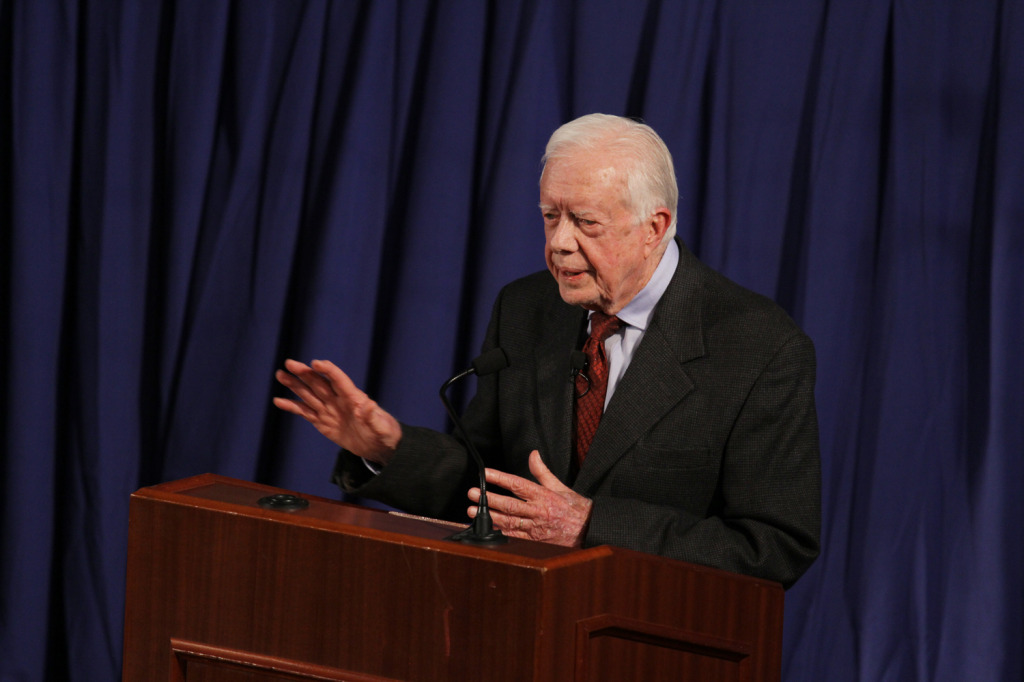Applause erupted in a packed Woolsey Hall Tuesday afternoon when former President Jimmy Carter called on Yale and other universities to adopt tougher penalties for sexual assault.
“You can just warn a boy and chastise him — that doesn’t help,” Carter said. “But expulsion is a very difficult thing for universities to accept as a policy.”
Although Carter drew attention to the oppression of women worldwide — such as female genital mutilation, slavery and honor killings — Carter also focused on the issue of sexual assault on college campuses. In particular, Carter referenced an August 2013 Huffington Post article that noted that six Yale students found guilty of non-consensual sex were not expelled.
According to the University Semi-Annual Report on Sexual Misconduct, between Jan. 1, 2013 and June 30, 2013 the University-Wide Committee on Sexual Misconduct found sufficient evidence to support six claims of undergraduate non-consensual sex. The report said that four of the guilty respondents were given written reprimands, one was placed on academic probation and another was placed on a year-long suspension.
“This is the responsibility of the students to demand that the leadership cooperate with them and make sure this is ended,” Carter said. “One thing to do is not support the boys who are guilty of sexual assaults.”
Rapes on college campuses are underreported compared to the national reporting rate, Carter said. Thirty-three percent of all rapes in civilian life are reported, he said, while only five percent of rapes on college campuses are reported. He also mentioned that 41 percent of all universities in America have not reported an incident of sexual assault in the past five years.
When Carter made note of the six Yale students, a visibly uncomfortable University President Peter Salovey said that Yale’s “policies and procedures have changed over the last year or two.”
“I’m glad to hear that,” Carter replied, giving a thumbs up. “I’m not surprised.”
“We’ve seen different outcomes,” Salovey said before trying to move onto a new topic, precipitating laughter in the audience.
“I’m not afraid to stay with that issue if people want me to, it’s just we have a lot of questions here about Ferguson,” Salovey said.
University’s Title IX Coordinator and Deputy Provost Stephanie Spangler could not be reached for comment after the talk on Tuesday.
Still, after the event, administrators defended the University’s responses to cases of alleged sexual misconduct.
Deputy Press Secretary Karen Peart said the Huffington Post article did not correctly “state the facts” about Yale’s sexual misconduct response.
Salovey added that collaboration between the administration and students on the University’s sexual misconduct policies has produced effective solutions.
“While we have more to do, over the past several years and with the collaboration of students who care deeply about these issues, we have made significant progress on the prevention and adjudication of sexual misconduct,” Salovey said in an email. “I believe we are headed in the right direction. I am committed to eliminating rape, sexual assault and sexual harassment from our campus.”
Students interviewed after the talk said that the University has not done enough to revise its sexual misconduct policies, but applauded Carter’s focus on sexual assault on college campuses.
“If [Yale’s policies] have changed, they haven’t changed adequately,” Maureen Flanagan GRD ’17 said.
Katie Roberts GRD ’17 said she thought many universities try to hide cases of sexual misconduct and that Yale needs to better articulate its policies to students.
Carter, a Nobel Laureate and the author of 28 books since he took office, also addressed many of the topics present in his new book “A Call to Action: Women, Religion, Violence, and Power.” After his exposure to many of the atrocities perpetrated against women globally, Carter said he felt compelled to show women’s rights as one of the most serious and unaddressed challenges of the present day.
“Thank you so much President Carter for that challenge, a challenge which resonates here at the University,” Salovey said during the talk.








